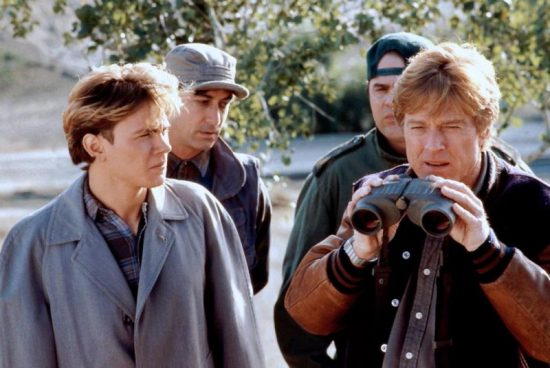Review: Sneakers – “The simple story is told beautifully”
There is a simple formula for the plot of a caper movie. You introduce the gang, and it is always a gang, performing a caper for the first act, you spend the second act motivating the gang to do a much more serious caper, and in the third act you pull off the serious caper. Fade to black.
Sneakers sticks to the formula religiously. The sub-plots are similarly formulaic, and for the whole film you can’t shake the feeling that you are watching a cover version of a film you’ve seen before.
We can dispense with the plot in a few sentences. Robert Redford is a security expert who tests the security of companies by breaking into them. He’s blackmailed – via reference to a shady past- into breaking into a new place and stealing the MacGuffin. He has second thoughts and breaks into the blackmailer’s place and steals it back.
But… the simple story is told beautifully, even unambitiously by director and writer Phil Alden Robinson (who also put together Field of Dreams) and what the script lacks in grandeur in makes up in lovely touches of characterisation. Personally, I’m inclined to think the star of the production must have been the casting director: to line up Mary McDonnell, River Phoenix, Sidney Poitier, Dan Aykroyd, and Ben Kingsley, and not only convince them to do the movie is one thing, to ensure that the personalities have chemistry and that each star is playing a role they can clearly revel in is quite another.
What elevates the film from forgettable once-seen to enjoyable Sunday-afternoon movie is the excellent dialogue and the obvious chemistry of the team (any two of Redford, Aykroyd, McDowell, and Poitier riff beautifully together and this isn’t lost in the larger groups). The director sensibly gets out of the way of his cast and lets them work with a script that carefully treads between comedy and drama. The main crew are ably supported by Ben Kingsley in chilling, rather than hammy, villain mode and Stephen Tobolowsky, whose transformation from bumbling victim to chilling creep, is handled effectively in a short amount of screen time.
There are imperfections in the film, notably the opening scene ignores the main cast in favour of establishing the said shady past, and James Earl Jones‘ one scene is fabulous, but insufficiently foregrounded. It also suffers a little from not really creating much in the way of a sense of peril, the viewer just presumes that Redford’s character is going to be charming at people until everything goes to plan. However, the overwhelming feeling is of a film of enjoyable triumph.
Some points deserve special mention: the dialogue, timing and delivery is sure-footed and solid, the set pieces, which are of course the mainstay of a caper plot, are nicely held together and the plot survives repeated watching. Two things stand out as exemplars that other film-makers should pay attention to: the quality of the technical dialogue and the enduring longevity of the film.
First the technical details: viewers of film and TV are used to characters delivering a few lines of technical gobbledygook whenever the writer needs a technical reason to drive the plot. Invariably this gobbledygook causes groans from those who do pay attention to technology. One of the astonishing things about Sneakers is that the technical gobbledygook – while serving the classic dialogue purposes of making the character sound smart and also driving the plot – does make sense, and does provide reasonable justification for the actions taken in the movie.
All of the security plot (the creation of the MacGuffin the team is to steal and the methods used to steal it) is reasonable, possible, and, amazingly the cast manage to say the right words in the right order and stress the right words in such a way that they genuinely convince sceptical technical nerds in the audience that they know what they are doing… (sadly this only extends to the dialogue and the actors, the visual effects department didn’t get the memo and so we are treated to some very dated visuals of ‘decryption’ happening in a very odd way). This is a film that is an example of how easy it is to get small details right when when you take the time.
Finally, this is linked to another point: the film has barely dated. Most characters are seen as scurfy and unfashionable so the hair and clothes haven’t dated, and the technical details -somewhat fortunately – describe problems that still exist. There are almost no scenes where you think, “Well he’d just sort that out with an iPhone these days” (although someone does use a car-phone at one point), and because the direction is so laissez faire there is no sense that the film is from another time, or trying to make a particular statement.
Sneakers is simply an enjoyable 126 minutes that you wouldn’t believe is now 20 years old.










